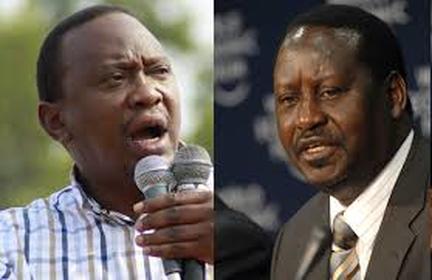Kenya: Will New Presidential Election Hold?
September 30 2017 By Abiodun Giwa
 Uhuru Kenyatta and Raila Odinga
Uhuru Kenyatta and Raila Odinga
A new presidential election is scheduled for October 26 in Kenya, following the annulment of Uhuru Kenyatta's reelection by the Supreme Court. Disagreement between the ruling party and the opposition may be threatening the new election date.
Unless the parties involved in the lection agree on conditions, their current stalemate may affect the timetable for the election itself, reports from Kenya suggest.
Kenya Daily Nation reports that Kenyans are already being impacted by the stalemate between the ruling party and the opposition, and the economy and business leaders are are asking for quick resolution.
What is happening in the East African country is representation of a country under political uncertainty as businesses have reportedly chosen to watch the political climate, while they withhold vital economic decisions. No one seems certain about where the pendulum will swing, and both parties appear to want the conditions that will favor it in the elections.
According to reports, the Jubilee Party - the ruling party, is in support of changing the electoral laws, which according to the opposition may change the voting system to manually operated system to replace computerized system, and it has expressed its unreserved opposition.
However, one good news is that the opposition has agreed to begin talks with the ruling party for a way forward, if the ruling party will discard the idea of bringing back a manual voting system scrapped in the nineties, in favor of the computerized system. Raila Odinga, the opposition party's presidential candidate describes the proposed change to the electoral law as changing the goal post middle of the game, he ruling party's forming of a committee to scrutinize proposed change to the electoral law, unacceptable.
Jubilee Party seems to favor changing the electoral law, while the opposition party favors changes in the electoral agency, because the agency as currently composed has compromised the integrity of the election, based on the court ruling. But the ruling party says the agency be allowed to handle the elections.
Consequently, the opposition party has threatened a mass action, if the ruling party decides to reject its call to overhaul the election agency, while at the same time embarking on changing the electoral laws. Archbishop Sapit of the Anglican Church, acting as umpire between the two parties condemns the opposition party's threat for a mass action and the ruling party's support for electoral law changes.
Unless the parties involved in the lection agree on conditions, their current stalemate may affect the timetable for the election itself, reports from Kenya suggest.
Kenya Daily Nation reports that Kenyans are already being impacted by the stalemate between the ruling party and the opposition, and the economy and business leaders are are asking for quick resolution.
What is happening in the East African country is representation of a country under political uncertainty as businesses have reportedly chosen to watch the political climate, while they withhold vital economic decisions. No one seems certain about where the pendulum will swing, and both parties appear to want the conditions that will favor it in the elections.
According to reports, the Jubilee Party - the ruling party, is in support of changing the electoral laws, which according to the opposition may change the voting system to manually operated system to replace computerized system, and it has expressed its unreserved opposition.
However, one good news is that the opposition has agreed to begin talks with the ruling party for a way forward, if the ruling party will discard the idea of bringing back a manual voting system scrapped in the nineties, in favor of the computerized system. Raila Odinga, the opposition party's presidential candidate describes the proposed change to the electoral law as changing the goal post middle of the game, he ruling party's forming of a committee to scrutinize proposed change to the electoral law, unacceptable.
Jubilee Party seems to favor changing the electoral law, while the opposition party favors changes in the electoral agency, because the agency as currently composed has compromised the integrity of the election, based on the court ruling. But the ruling party says the agency be allowed to handle the elections.
Consequently, the opposition party has threatened a mass action, if the ruling party decides to reject its call to overhaul the election agency, while at the same time embarking on changing the electoral laws. Archbishop Sapit of the Anglican Church, acting as umpire between the two parties condemns the opposition party's threat for a mass action and the ruling party's support for electoral law changes.
Comment Form is loading comments...

